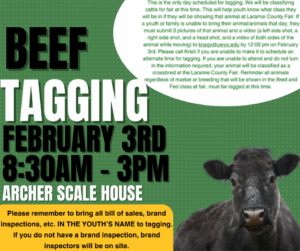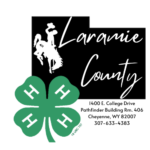Animal Ownership Deadlines
Beef – February 1
Goats, Swine, Sheep – June 1
Horse – June 1
All Market Sheep, goats, and swine animals must be tagged and information loaded into ZSuite by 5 PM on June 1st to be eligible to show.
Please read IMPORT RULES (below) before purchasing your animal out of state

There will be three tagging dates for Goat, Sheep, and Swine. All Goat, Sheep, and Swine MUST be tagged at one of the taggings. These will be announced via social media & email updates. No tags will be handed out from the office. Youth will need ownership papers for Goat and Swine and Brand Papers for Sheep, as well as the animals to one of the 3 taggings. All taggings will take place at Archer. Those bringing Lambs and Goats will take the first turn into the Archer complex between the old fair office and M/K. If you are bringing Swine you will take the second turn into the Archer complex between M/K and the event center. The scale house will be open if you would like to weigh your animals. Just as a heads up, animals will be restrained as necessary.
- All tagging and documentation must be completed by May 31st to be eligible for county or state fairs.
- Breeding swine attending the Wyoming State Fair will need tagged at a later time.
- Breeding Sheep, Breeding Meat Goats, Dairy Goats, and Pygmy Goats not entered in market classes do not need to be fair tagged. However, all sheep and goats are required to be Scrapie tagged per Wyoming Livestock Board policies. Scrapie tagging information is attached.
- Wyoming State Fair will accept 840 series RFID tags. These tags are USDA approved official identification because they are tied to an individual livestock producer through premises ID and animals already with 840 series tags will be accepted by WSF and any Wyoming county fair.
Wyoming Scrapie Tag Requirements
Livestock Born and Raised at Home Form Rev12012
This is the only day scheduled for tagging. We will be classifying cattle for fair at this time. This will help youth know what class they will be in if they will be showing that animal at Laramie County Fair. If a youth or family is unable to bring their animal/animals that day, they must submit 3 pictures of that animal and a video (a left side shot, a right side shot, and a head shot, and a video of both sides of the animal while moving) to knagy@uwyo.edu by 12:00 pm on February 3rd. Please call Kristi if you are unable to make it to schedule an alternate time for tagging. If you are unable to attend and do not turn in the information required, your animal will be classified as a crossbred at the Laramie County Fair. Reminder all animals regardless of market or breeding that will be shown in the Bred and Fed class at fair, must be tagged at this time.
**** Please remember to bring all bill of sales, brand inspections, etc. IN THE YOUTH’S NAME to tagging. If you do not have a brand inspection, brand inspectors will be on site.
Breed Classifications
Youth Quality Assurance
If a youth is planning on selling a market animal in the 4-H sale at the Laramie county fair, the youth is required to take QA once in each 4-H age group they are registered in (once as a junior 8-10, once as an intermediate 11-13, and once as a senior 14-18). Ages are based on the youth’s 4-H age (age as of Jan. 1st of the 4-H year: The age the youth was on Jan. 1, 2021). This includes both large and small market animal sellers.
It is encouraged for Juniors to attend at face-to-face class, however they can also take the online class like the Intermediates and Seniors. The online course cost is $12.00. IF this creates a hardship for a family, scholarships are available to assist with the cost. If a family struggles with internet at their home and they are unable to get online to complete the course, please call the 4-H Office to schedule a time to complete the course in office.
To RSVP, check if your youth needs YQA, or need online course information for your Intermediate or Senior youth please contact the office at 307-633-4383 or LaramieCountyExtension@uwyo.edu
Mandatory Livestock Meeting Handouts
Livestock Import Policies
As you are purchasing your animals this spring please keep the following things in mind, especially if you purchase animals from outside of Wyoming.
The Wyoming Livestock Board has policies in place regarding the importation of animals into the State of Wyoming to comply with federal regulations. They can be found at. Please review these recommendations before purchasing your animal from out of state so you can work with your buyer to ensure you comply with Wyoming regulations.
Laramie County Fair Superintendents
The following link includes the names and contact information for the 4-H Animal Project Superintendents for Laramie County Fair. Feel free to contact them with any questions or concerns you may have about your animals and Fair.
Please contact the 4-H Office for the most recent superintendent list
The 4-H meat goat project is an exciting and educational opportunity for 4-H members. It requires very little room, expense, or daily chore time. It is also a short-term project, especially when compared to the horse, beef cattle, or dairy cattle projects. Goats are also much smaller and easier to control and handle. Meat Goats
4-H members learn recommended finishing rations, how to give proper care to animals, and how to use good management procedures. Members should feed one or more market lambs for market. Sheep
The market beef project is for the 4-H member interested in nutrition, fitting, and showing cattle. They may own and care for one or more market animals. Beef
The member can use either registered or grade cattle, or a combination. In either case, top quality animals should be used to start the project. Members with purebred livestock learn how the registered breeder produces sound, genetically superior animals for the commercial breeder. Individuals with commercial cattle learn the importance of raising productive beef in an economical program to produce a product that has strong acceptance with the consumer. Beef
The member carrying purebred sheep learns the working of the purebred and registered industry and the responsibilities of raising sound and improved stock for commercial breeders. The purpose of raising commercial sheep is to provide the consumer with the right type of lamb carcass. Learning includes selection, nutrition and health care, herd management and improvement, and marketing. Members own and care for at least one breeding animal. Sheep
This project gives the 4-H member experience and skill in producing breeding animals. Participants learn about judging, management, selection for breeding purposes, health care, marketing, and sound swine nutrition. Members start with one or more weaned gilts, boars, bred gilts, or sows. Piglets are grown out until they reach an age suitable for breeding purposes. Swine
Members learn proper care, nutrition, and management of dairy goats. They also learn about showing, selection, fitting, and grooming. Breeding and feeding practices must receive special attention. Members must own, feed, and care for at least one dairy goat. Dairy Goats
The 4-H member learns horse breeds, colors and markings, horse gaits, grooming and preparation for show, showing at halter, care of horse’s feet, horse training, and safety rules and precautions. This project teaches management, techniques related to nutrition, health, first aid, teeth and aging, in addition to horsemanship, fitting, showing, caring for tack and equipment, horse demonstrations and judging. Members can own or lease one or more horses and be responsible for feeding, maintenance, grooming, and care. (Ownership is not required – members learn through lessons in the manual, giving demonstrations and attending clinics and seminars.) Horses
Horse Safety Certifications
All 4-H horse project members must be safety certified on each horse they plan to show at the Laramie County Fair. If you need to be certified on a horse or add endorsements please sign up for one of the times below. All certifications must be completed by the announced deadline each year. If you think you may need to add a horse or endorsement it is best to RSVP for a time slot so you have a time reserved. Please do not wait until the last date to attend; volunteers can only certify so many kids on each date so please don’t wait to sign up.
While premiums will be awarded according to the Laramie County Fair policy, the committee has decided eligibility for awards sponsored by the committee will be contingent upon participation in the horse project during the year. We have not yet finalized the exact requirements, but please watch your email in early April as we will be posting the eligibility requirements for year end awards.
Horse Safety Certification Dates
All clinics will be open to all age divisions of 4-H and FFA horse project registered youth. Please review the clinic and certification dates below. Certifications will be from 4:00 to 5:30 with the clinic starting at 6:00. Please call the Extension office to schedule certifications and rsvp for clinics. You have to be on the schedule to participate in certifications. YOU MUST BE CERTIFIED prior to participating in the clinics. To participate in fair, you must be certified by the announced date each year.
Certification and clinic dates will be available in the Spring of 2024 If you have questions about certifications or endorsements contact the Extension Office or a 4-H Horse Committee Member.
ZSuite Horse Certification Records Entry
All 4-H horse members who have certified on a horse in the past, or who plan to certify on a horse this year need to enter their horse into their ZSuite profile. This will be used to track your safety certifications in the future. All horses must be entered by May 31st, with photos. If you have questions please contact the Extension Office.
4-H members receive experience and develop skills for producing market pork. They will have a working knowledge of swine nutrition, health care and fattening. In this project members start with one or more weaned barrows or gilts and feed them for market. Swine
In consultation with the State Vet’s office, please share with families that do purchase swine from out of state:
- Animals coming into Wyoming need to have an official USDA ear tag in their ear. They should be put in the ear by the producer. Additionally, the vet that inspects the animals before they are shipped to Wyoming should be calling the Wyoming State Vet’s office to get an import permit number that is placed on the health papers (CVI).
- Link to USDA official ear tag summary for ALL species. (Tables 4, 5, and 6 are most applicable to 4-H market swine projects from out of state). Link to Official Ear tag Summary
- If a pig arrives in Wyoming from out-of-state without an ear tag, the 4-H member should contact their local veterinarian to inspect the animal and manage any other additional requirements.
Again, these are for animals that are shipped into Wyoming from another state. If you have questions about the import policies/requirements please contact the Wyoming Livestock Board.
Swine Health Recommendations: Exhibitors of All Pigs Going to Exhibits or Sales
HELPFUL LINKS:
- ZSuite (Member fees MUST be paid to the Extension Office before a member will be activated)
- Swine Breed Identification
- More Swine Breed Identification
- Swine Ear Notching
